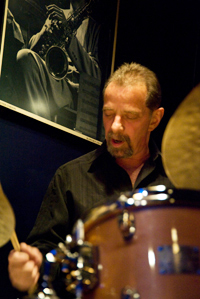"I want to get students to be very efficient in the practice room, focused and disciplined. So I have developed some ideas that help the student—and myself—to focus more while they practice. I have them know exactly how long they're going to practice. So if a student has an hour and a half, and I give them six subjects to work on, I want 15 minutes each subject, then put it away until the next day. Even if you're just about ready to get something pretty well, if the 15 minutes is up, you put it away until the next day. That way they don't waste any time practicing. That tends to help them on the bandstand to stay focused."
"I've been playing professionally since I was 15. I was 17 when I went to Berklee and got the bug for jazz, and I've been pursuing that ever since. The Fringe started our senior year, and we've been going ever since. The original bass player was faculty member, Rich Appleman, then in 1984 we switched to John Lockwood, with George Garzone and myself, and we're still going."
"I think that with the way the economy is, if you're a good player and you've got a good attitude on the bandstand and knowledge of what you're playing, it's as stable as any other industry. I think it's just a matter of getting the concentration and the discipline and the repertoire down and having a good attitude and showing up on time and just being a pro. If you hang with it, you can hack out a living. It can be just as stable as anything else. If you make it big, great. If you just earn a living and survive, then you are successful. I've been able to make a living playing my instrument, and that's what I'm most proud of and happy about."

